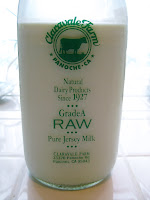I used to think goat milk was something from another planet. In fact, I must have been in my 30's, at least, before I even heard of anyone drinking goat milk! But then again, I grew up where there were plenty of cows. And I use to judge dairy cattle. How in the world did I miss out on the fact that you could milk a goat? Does that tell you something about the American bias towards goats? The rest of the world must think we're a bit strange since goat milk internationally is by far more popular.
If you were just to drink a glass straight up, you probably wouldn't be able to tell the difference in taste... much. Some cow milk is a bit richer because of the butterfat content, but some goats give milk with a nice butterfat, too. Nubians for one (around 5%), and some La Manchas (3.9%). And of the dwarf varieties, Nigerians (anywhere from 6 -10%). A lot of factors will determine the butterfat content, so one can't be dogmatic about the amount. Just know it's typically higher in some breeds than others and cows aren't the only ones that have a nice butterfat content.

Photo Credit: Compassion in World Farming
Cow milk in it's raw state is not homogenized, which means the fat globules are rather large and it causes the cream to separate from the rest of the milk. When milk is homogenized, the fat globules are broken into smaller particles, thus making it more uniform throughout. The problem with this is the concern that when milk is homogenized (fat globules broken up) it causes arteriosclerosis or other health issues when consumed over a period of time. Left unhomogenized, the fat globules are too large to cause a problem to begin with. If you were to drink the cow milk raw, you could avoid this issue by just shaking the container each time before you pour it out. Then you get some of both the milk and the cream.

Photo Credit: Tambako the Jaguar
Goat milk, however, is naturally homogenized because the fat globules are inherently smaller. This would seem to be a problem except that it lacks a fat-agglutinating protein called euglobulin, which if present, would cause the fat globules to cling to one another and build up. Instead, the smaller fat globules remain suspended throughout the milk itself and thus, is a plus for the goat milk and explains why it's easier for some to digest it. While cow milk does contain euglobulin, I suspect this protein may explain why it's easier to make butter from cow milk rather than goat (just guessing here).
Just a side note... when milk is homogenized by mechanical means, breaking down the fat globules, the enzyme xanthine oxidase is freed. This enzyme penetrates the intestinal wall, going into the bloodstream, and eventually, the heart and arteries causing scar tissue as well as generating cholesterol in the body.
Oh, that's not good.
Another point for raw milk.
But we're talking goats and cows here.
Both milks in their natural, raw state contain the lactase enzyme which allows many with lactose intolerance to "tolerate" raw milk whether it's from a cow or a goat. Once it's pasteurized, the lactase enzyme is destroyed and those without enough lactase enyzyme in their own system will know it shortly after consumption.
If we were to compare fat, proteins, calcium, vitamins and such contained within each milk, most feel there just isn't enough of a difference to haggle over. And given the fact that during the animal's lactation period those components won't remain constant it makes it hard to compare them. However, at the University of Granada in Spain, they've apparently been doing some research comparing the two and they're favoring the goat milk. According to their experiments and analysis, "... goats' milk could help prevent diseases such as anemia and bone demineralization. Goats' milk was found to help with the digestive and metabolic utilization of minerals such as iron, calcium, phosphorus and magnesium." (Science Daily, June 31, 2007). It seems the bioavailability of these minerals is higher in goat milk than in cow.
At this point, I'm thinking that both are pretty good for you if you're consuming them raw. But I'm definitely feeling like there may be some benefits to the goat milk that I hadn't realized before. It's certainly given me a new appreciation for it. And when I get my own does to milk, I suspect I'll be a bit partial just because they're mine.
Photo Credit of Milk Bottle: Search Yogi



